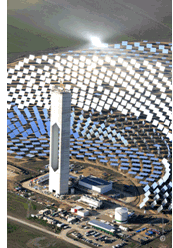
|
|
|
|
|
|
|
News & Views item - July 2009 |
![]() US National Research Council Report: America’s Energy Future: Technology and
Transformation. (July 29, 2009)
US National Research Council Report: America’s Energy Future: Technology and
Transformation. (July 29, 2009)
The 184 page summary edition capstone report of the "America's Energy Future" project of the National Research Council, the operating arm of the National Academy of Sciences and National Academy of Engineering states that with a sustained national commitment, the United States could obtain substantial energy-efficiency improvements, new sources of energy, and reductions in greenhouse gas emissions through the accelerated deployment of existing and emerging energy technologies.
It warns that initiating deployment of these technologies is urgent; actions taken -- or not taken -- between now and 2020 to develop and demonstrate several key technologies will largely determine the nation's energy options for many decades to come, and the report states that it is imperative that the United States promote a wide range of energy technologies, ranging from energy efficient buildings and electric cars to sequestering carbon and new nuclear plants.
It argues for large-scale demonstration projects on new energy technologies, e.g. the capturing and sequestering of carbon emissions from coal-fired electric plants: “The urgency of getting started on these demonstrations to clarify future deployment options cannot be overstated.”
The report claims that improvements in energy efficiency, particularly in buildings and vehicles, could offset all the projected increases in U.S. energy use through 2030, but notes that in other areas such as that of phasing out the use of petrol for transportation there will be few widely-available options until 2020. However, post 2020 methodologies to convert coal and biomass to liquid fuels and improved electric cars may begin to have a significant impact on atmospheric carbon reduction.
Harold Shapiro, president emeritus and a retired professor of economics and public affairs at Princeton University who chaired the Academies' analysis says: "Long-term problems require long-term solutions, and only significant, deliberate, stable, integrated, consistent, and sustained actions will move us to a more secure and sustainable energy system." And the report emphasises that wide-ranging research and development over energy technologies need to be undertaken even if some of them might not work out. Nevertheless, it agrees that so doing will in itself be a massive undertaking.